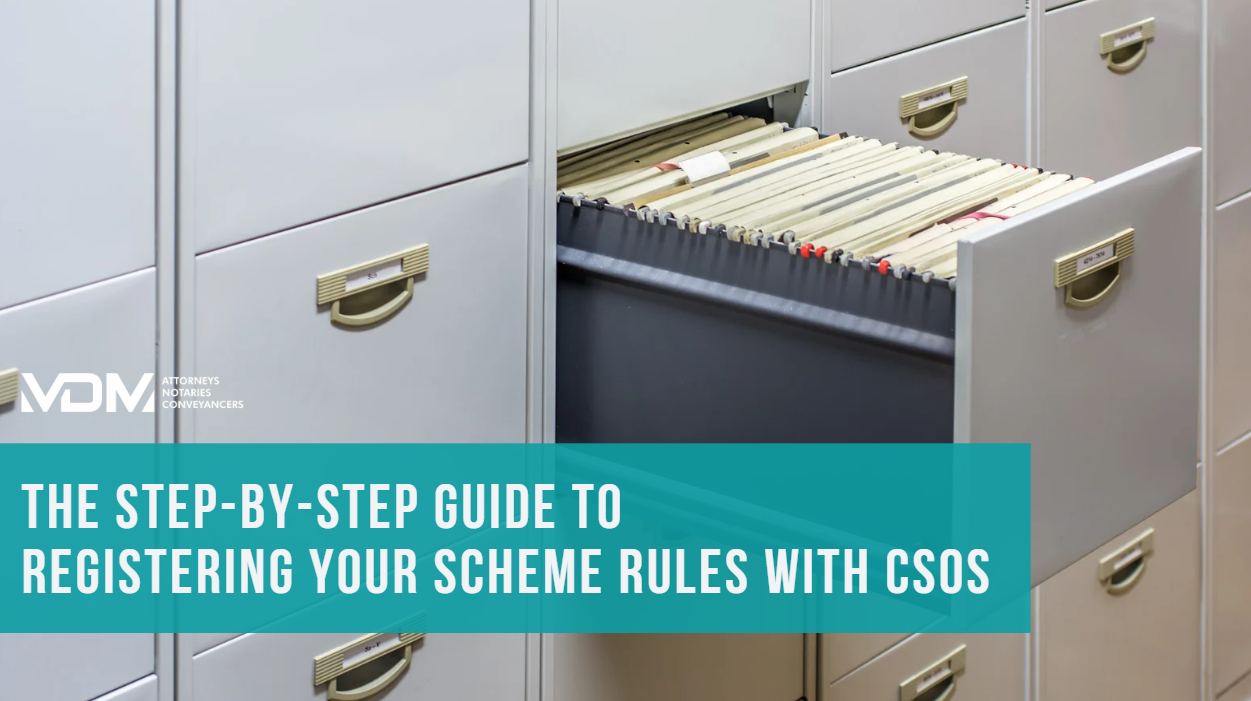
If you’re a trustee or managing agent in a sectional title scheme, you’ve probably heard that your scheme’s rules must be lodged with the Community Schemes Ombud Service (CSOS) - but what does that actually mean, and how do you do it properly?
Many schemes still operate under outdated or unregistered rules, leaving them exposed to disputes, invalid provisions, and compliance risks. This guide explains why registration is required, what the process involves, and how to get it right the first time.
Why You Need to Register Scheme Rules with CSOS
The Sectional Titles Schemes Management Act (STSMA) requires that all management and conduct rules - whether newly drafted or amended - be approved and filed with CSOS before they become enforceable
If they aren’t registered:
- The rules have no legal effect;
- Trustees cannot enforce them; and
- Owners may challenge penalties or decisions based on them.
CSOS ensures that scheme rules are reasonable, lawful, and consistent with national legislation and the model rules published in Annexure 1 of the STSMA Regulations.
The two categories of rules
Every sectional title scheme has two separate sets of rules in Annexure 1 of the STSMA Regulations:
- Management Rules (PMRs) - Regulate trustees, meetings, finances, levies, maintenance, and governance.
- Conduct Rules (PCRs) - Regulate behaviour of owners and occupiers, pets, parking, use of common property.
Step-by-Step: How to Register Your Scheme Rules with CSOS
Step 1: Review and Update Your Rules
Start by reviewing your existing rules - many are still based on pre-2016 templates. Ensure they align with the latest STSMA, CSOS Regulations, and Constitutional principles.
💡 Tip: Check for clauses on pets, short-term letting, or penalties that may be outdated or unlawful.
Step 2: Draft or Amend the Rules
If you’re changing or adding anything, the amendments must be properly drafted - ideally by a specialist attorney familiar with sectional title law.
Each clause should clearly indicate whether it applies to management or conduct matters.
Step 3: Obtain Approval at a General Meeting
Changes must be approved by the body corporate:
- Management rules: Unanimous Resolution, i.e. all members must agree (unless purely corrective or clarificatory).
- Conduct rules: Special Resolution (typically at least 75% of those present and represented must vote in favor).
Ensure the meeting is properly convened and minuted, with the resolution wording included in the minutes.
Step 4: Prepare the CSOS Lodgement Pack
Your submission to CSOS must include:
- A cover letter stating the scheme’s name, SS number, and the nature of the submission (new or amended rules);
- A certified copy of the resolution approving the rules;
- The signed set of rules in editable format (Word document, not PDF); and
- Trustee details and contact person for correspondence.
Step 5: Submit to CSOS
Email the documents to your regional CSOS office (Gauteng, Western Cape, or KZN). You’ll receive a reference number and may be asked for clarifications or corrections.
⚠️ Processing can take several weeks, so plan ahead -unregistered rules remain unenforceable until formally approved.
Step 6: Receive Approval and Certification
Once CSOS has reviewed and approved your submission, you’ll receive an official stamped and signed copy of the rules.
Keep both digital and printed copies accessible to trustees, managing agents, and new owners.
Common Pitfalls to Avoid
- Submitting PDFs instead of editable Word versions
- Missing or incorrect resolution wording
- Using outdated prescribed rules
- Trying to enforce unregistered amendments
- Neglecting to update CSOS after rule changes
How VDM Attorneys Can Help
Registering scheme rules isn’t just administrative - it’s legal. Poorly drafted or unregistered rules can lead to costly disputes, unenforceable penalties, or invalid trustee decisions.
VDM Attorneys assists body corporates, homeowners associations, and managing agents with:
- Drafting and updating management and conduct rules;
- Ensuring full compliance with the STSMA and CSOS;
- Handling submissions and correspondence with CSOS; and
- Providing ongoing legal advice to trustees and developers.
Before you submit your rules - or if your scheme isn’t sure whether its rules are valid - let our sectional title specialists guide you through the process.
📩 Contact Johlene ([email protected]) at VDM Attorneys to review and register your scheme’s rules properly, the first time.